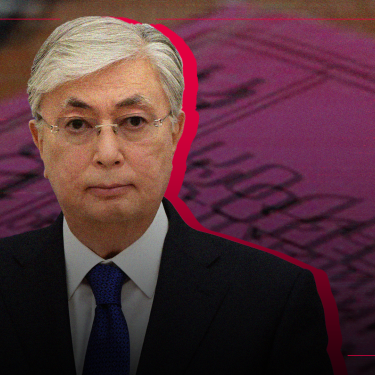Kazakh president urged to repeal new media law, carry out real reform instead

On the pretext of improving the environment for journalism, Kazakhstan’s president has signed a “law on the media” that is liable to increase his government’s control over the press. Reporters Without Borders (RSF) calls for its repeal and replacement by a real reform, and voices concern about the growing use of legislation to harass Kazakhstan’s journalists.
The stated goal of the “law on the media” that President Kassym-Jomart Tokayev promulgated on 19 June is to provide journalists with better safeguards for their work of researching and disseminating information. But, in practice, it mostly restates existing laws, and seeks to control the media rather than protect them.
Article 1 of the law has a definition of media that implicitly introduces a requirement for outlets to obtain a permit before they begin operating, which is contrary to the principle of press freedom. It also bans foreign journalists from working in Kazakhstan without accreditation (article 30). In the current political context, it is feared that this new measure means reporters working for media critical of the authorities are more likely to be banned arbitrarily. Article 11 also bans media from “making propaganda” for suicide without clearly defining what is meant by making propaganda.
“Far from improving the working environment and protection for journalists, the law signed by President Kassym-Jomart Tokayev can in fact be used to censor them. It is regrettable that this ‘revision’ includes only minor progress and has resulted in a law that is far removed from international standards. Given that Kazakhstan already fell eight places in this year’s World Press Freedom Index, RSF calls on the president to think again.
Concern about the new media law is all the greater because the government is already increasingly using legislation to step up its harassment of journalists, including a law on “spreading false information” that is subject to broad interpretation.
Zhamila Maricheva, a specialist in investigating corruption and public spending, became the first journalist to be convicted under this law on 6 June, when an Almaty court confirmed her fine for a 30 January post on her Telegram channel ProTenge voicing support for 36 reporters for Radio Azattyq (the Kazakh-language service of Radio Free Europe/Radio Liberty) who had been denied accreditation. Her post made the mistake of citing the proposed new media law, which had no bearing on the accreditation decision, the court said.
Daniyar Adilbekov, a journalist with the Press.kz news site who also runs the Dikaya Orda Telegram channel, has been detained since 27 March on a charge of “spreading false information” without being given access to the prosecution case file, in a violation of his rights.
